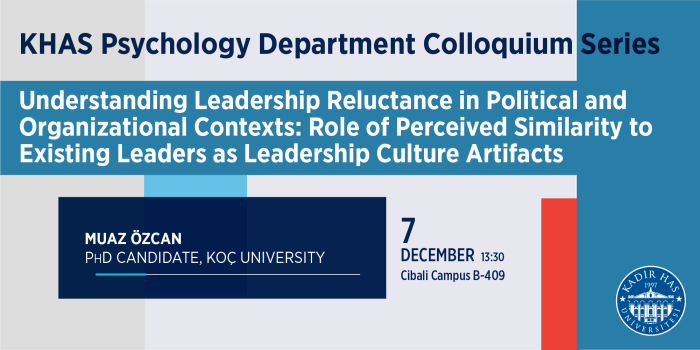
KHAS Psychology Department Colloquium Series – Muaz Özcan

KHAS Psychology Department Colloquium Series host Muaz Özcan (PhD Candidate, Koç University) on Thursday, December 7, between 13:30 and 15:00 at B-409 for his speech titled “Understanding Leadership Reluctance in Political and Organizational Contexts: Role of Perceived Similarity to Existing Leaders as Leadership Culture Artifacts.”
Abstract: Widespread leadership reluctance threatens leadership quality and diversity in organizations and societies. As producers and artifacts of their group’s leadership culture, existing leaders signal the shared beliefs, expectations, and values regarding leadership within their collectives to observers. This presentation encompasses three studies on the relationship between similarity to existing leaders and leadership reluctance. The first study is a theoretical discussion of how leaders actively and passively influence, sustain, and reflect their group’s leadership culture. The subsequent two field studies, conducted in political and corporate settings, reveal indirect yet significant connections between similarity to existing leaders and leadership reluctance.
The initial field study surveyed political candidates during the 2019 Turkish local elections. Results showed that the level of similarity candidates perceive between them and their party leader could predict higher leadership reluctance through more frequent participation in party campaign activities. Notably, the similarity was a significant predictor of participation only for the candidates of the incumbent party, which is more centralized and leader-centric than the opposition party and led by a leader often considered more charismatic and successful than his counterpart. The second study, involving corporate employees, demonstrates that alignment between the leadership styles practiced by organizational leaders and the styles employees reported they would adopt if they became leaders is indirectly associated with lower leadership reluctance through higher psychological safety.
These studies provide insights into the intricate relationship between similarity to existing leaders and leadership reluctance. They can also benefit scholars and practitioners seeking to develop more effective interventions to mitigate leadership reluctance. Future research should explore causality using experimental or longitudinal methods and examine whether other artifacts of leadership culture, such as leadership-related terminology, objects, and symbols, relate to leadership reluctance.
